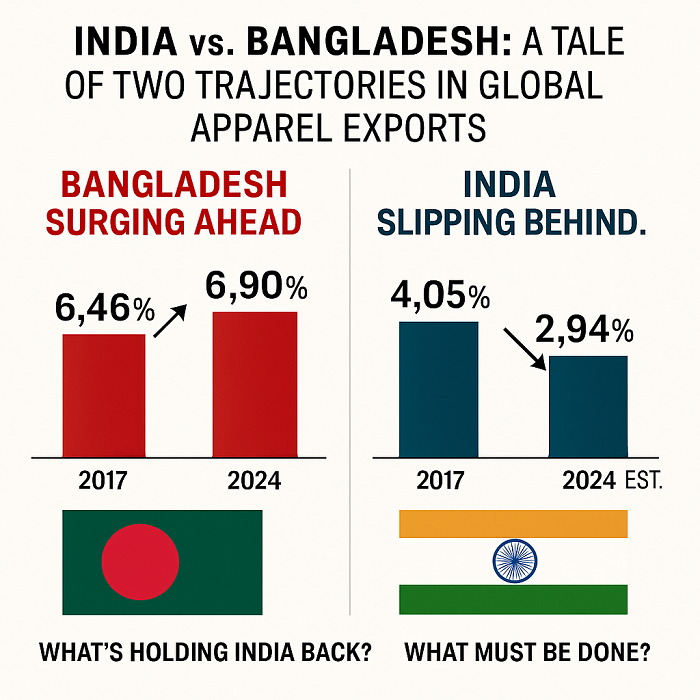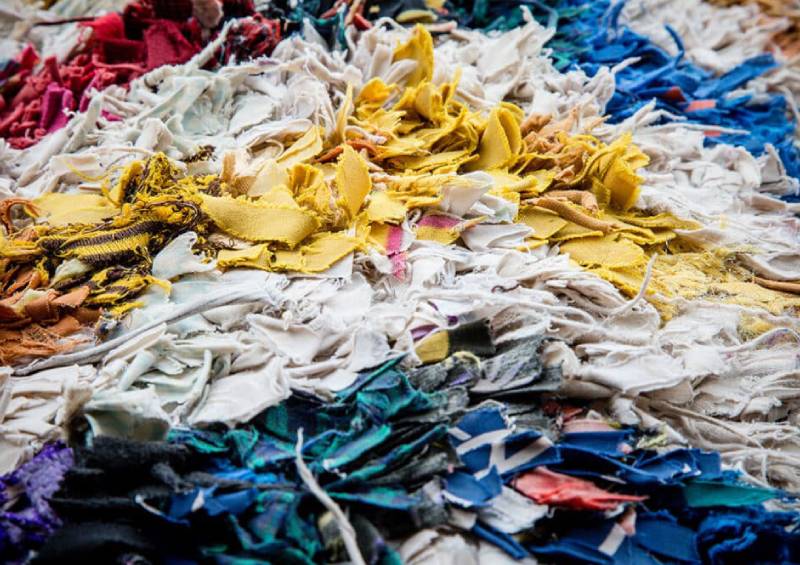The Blossom Premiere Vision show, organised by GL events Fashion division, successfully hosted its Spring edition on June 4-5 at Carreau du Temple, spotlighting early insights into Autumn-Winter 2026-27 pre-collections. The event marked a strategic moment for the luxury sector, which continues to evolve amid global market shifts and mounting pressure to innovate.
This edition brought together nearly 80 high-end exhibitors, 87 per cent of whom were from Italy and France. Over 1,000 fashion professionals, including top-tier luxury houses, attended the two-day showcase, reaffirming the relevance of Blossom PV’s June edition as a vital platform for sourcing and trend direction.
The show highlighted four core creative sectors: fabrics, leather, accessories, and artisanal know-how. It also introduced a dedicated business matchmaking service, helping participants optimise their schedules and foster meaningful connections ahead of the event.
For the first time, a Trend Forum was staged on-site, giving visitors a first look at key creative directions for AW26-27. Themes such as Cosy Drapes, Emblematic Know-How, Embellished Surfaces, and Silvery Sheens offered a preview of the textures and tones shaping the future of luxury fashion.
Serving as both a sourcing hub and inspiration lab, Blossom PV continues to adapt to the changing needs of luxury brands. The complete seasonal colour palette and trend forecast will be unveiled at Premiere Vision Paris, scheduled for September 16-18 at Paris Nord Villepinte.
The Hab by Usha aims to host the Sewing Festival India 2025 at its experience center in Mumbai.
To be held in coincidence with the International Sewing Day, the three-day festival will run from June 13-15, 2025. It will help promote innovation in sewing, sustainability, and handmade design.
Focusing on the ‘Stitchverse: The Future of DIY Fashion & Craft,’ the boutique-format festival will feature a dynamic program of workshops, discussions, and creative engagements. These activities are designed to highlight the modern maker movement, according to the event organizers.
The workshop will boast of features like, 'Stick & Stitch' event that will explore upcycled embroidery through DIY kits. It will be hosted by Akshata Jain of Knot Your Type.
Another feature of this workshop will include the session titled, 'Scrap to Swag' by Renu Sisodiya, Experience Lead, The Hab, focusing on creating patches from textile remnants. At the ‘Totes & Trims' workshop with Rabab Kanchwala of G&R, participants will craft reversible gingham totes.
The panel sessions at this workshop will delve into themes of creativity and conscious fashion. The session titled, ‘Roots & Revolutions will bring together Mayank Bhutra of Erode Clothing and Mousmi Sejpal from Hemp Fabric Lab to discuss heritage and sustainable materials.
The second session tilted, 'Thread Therapy' will focus on sewing as a creative outlet beyond the traditional workday while the session, 'From Hobby to Hustle' will offer brand-building insights from Amaara Sangam, head of The Hab by Usha.
Sewing Festival India is grounded in heritage but boldly future-facing, said a representative from the company. Stitchverse is where future-forward making meets community and The Hab by
Usha aims to foster a vibrant community around the craft of sewing, inspiring both seasoned crafters and new enthusiasts, he added.
High-end fashion house Chanel is expanding into waste management and recycling with the launch of a new venture called ‘Nevold.’
Launched with an aim to develop end-of-life solutions for textile offcuts, unused fabrics, and unsold old products, this move comes amidst increasing concerns about the sheer volume of waste generated by the fashion industry. While often attributed to fast fashion, the luxury sector, which mass-produces millions of units, also contributes significantly.
In Europe, regulators are introducing new rules to make brands more accountable for the waste they generate. These regulations will help crack down on the luxury industry's historical practice of simply destroying unsold goods.
Chanel has been preparing for Nevold's launch for several years, The luxury giant has already built a manufacturing division with over 50 specialized factories and ateliers through a decades-long effort to future-proof its supply chain. These investments include companies like embroiderer Lesage, feather-and-flower specialist Lemarié, and hat maker Maison Michel. These entities produce goods for Chanel but also offer services to other fashion businesses.
In the long term, Chanel's aims to make Nevold a part of a ‘profound transformation process that is rethinking the entire product lifecycle, developing new savoir-faire and professions… and contributing to a more circular economy.
At Nevold's core are three companies Chanel has either established or acquired in recent years: L’Atelier des Matières, a recycling agent that connects brands with optimized solutions for their textile waste, unused fabric, and unsold inventory; Filatures du Parc, a 50-year-old spinning mill specializing in yarns made from recycled materials; and Authentic Material, a leather recycling specialist.
The idea is that these companies will collect waste generated by Chanel and other clients and transform them into "new materials for tomorrow" that can be used by Chanel itself, but also sold to other brands and industries.
Nevold is considering acquisitions to accelerate its current capabilities and exploring partnerships with other sectors, such as sports and hospitality, to ensure a second life for materials that no longer meet luxury market standards, Pavlovsky added. For example, the company has found that recycling leather back into a material suitable for a high-end handbag is currently not feasible, but the resulting product could replace common plastics in items like high heels and reinforcements for footwear and handbags.
Last year, Chanel spent an estimated $225,000 to support the development of closed-loop recycling systems capable of transforming old materials and unused stock back into new fabrics and yarns for its fashion and leather goods houses. It expects to increase its investment to $300,000 this year. Meanwhile, Gucci-owner Kering has invested in French recycling business Revalorem and resale site Vestiaire Collective.
To celebrate the World Environment Day 2025, India’s prominent textile player, Sanathan Textiles launched the ‘Plastic-to-Plant’ Exchange Drive. Held in collaboration with Sila across Mumbai and Silvassa, this two-day drive successfully engaged the community in the circular economy and fostered positive climate action at the local level.
The drive invited members of the public, dubbed ‘green champions,’ to donate a minimum of 200 grams of plastic waste in exchange for a plant sapling. Recording an overwhelming participation, this initiative resulted in the distribution of 2,500 saplings and the creation of 2,500 micro green zones in homes, offices, and communities. It helped successfully divert 500 kg of plastic from landfills, contributing to measurable climate action. The distributed plants are projected to absorb an estimated 625-750 g of CO₂ per day, totaling approximately 228–274 kg annually, creating a lasting carbon offset with local impact.
Recognizing the initiative’s positive impact, Sanathan Textiles was invited by the Brihanmumbai Municipal Corporation (BMC) to conduct a special session for 80 BMC officials. During this session, Sanathan shared insights on its circular initiative, distributed plants, and encouraged pledges to reduce plastic use.
According to Sammir D Dattani, Executive Director, Sanathan Textiles, this initiative aligns perfectly with the World Environment Day 2025 theme – Our Land. Our Future. It reflects the company’s belief that sustainability is not just about internal transformation but also about inspiring community participation. By merging ESG priorities with collective citizen action, Sanathan Textiles aims to foster a sense of environmental responsibility that is accessible, impactful, and scalable.
Anaji Mane from the BMC adds, Sanathan Textiles’ initiative is a brilliant example of circularity in action, aligning with Mumbai’s climate goals while empowering our staff to adopt more sustainable practices both professionally and personally. With climate challenges intensifying each year, partnerships like these are vital.
This initiative highlights Sanathan Textiles’ dual approach: driving environmental progress through sustainable production and engaging the community through meaningful Corporate Social Responsibility (CSR) actions. The company also manufactures Sanathan Reviro, a product that uses 90 per cent less water, 60 per cent less energy, and emits 26 per cent fewer greenhouse gases.
With over two decades of experience, Sanathan Textiles is a leading yarn manufacturer in India, specializing in polyester filament yarns, cotton yarns, and yarns for technical textiles. Its extensive product portfolio serves diverse industries, including apparel, home textiles, automotive, and defense. The company boasts over 3,200 yarn products, nearly 50,000 SKUs, more than 7,000 customers, over 400 distributors across India, and exports to approximately 27 countries.
Hosted by Cotton Incorporated on May 15, 2025 in Hong Kong, the Cotton ConneXions Summit brought together industry leaders from over 124 countries. The event was attended by 124 companies, including more than 41 top global brands, sourcing organizations, manufacturers, and retailers.
The summit's agenda focused on forward-looking insights, starting with opening remarks from Metakeys: William Kimbrell, President and CEO, Cotton Incorporated and Marvin Arthur Beyer Jr, Chairman of the board,
Attendees received a global market outlook from Mark Messura, Senior Vice President - Global Supply Chain Marketing, Cotton Incorporated, who discussed economic and trade shifts impacting cotton's role in the supply chain. Heidi van den Hul, Founder, fabriCreation, delivered a presentation on global compliance impacts.
Other presentations covered a range of topics, including Fall/Winter 2026/2027 cotton trends, next-generation dyeing and finishing technologies, strategies for reducing the environmental impact of textile production, and cotton's role in a low-carbon, plastic-free future.
The event also featured the newly updated Cottonworks.com website, which aims to be the most comprehensive resource for cotton available to the industry.
The Cotton ConneXions event helps Cotton Incorporated serve as a convener of global decision-makers, especially within the dynamic Asian region, states Kimbrell. The organization recognizes the importance of collaboration for meaningful progress in the supply chain.
British textile machinery firms are set to highlight cutting-edge innovations in testing, instrumentation, and machine control at ITMA Asia + CITME 2025 in Singapore, taking place from October 28–31. The British Textile Machinery Association (BTMA) has confirmed that several of its members will showcase pioneering technologies that aim to transform how textiles are evaluated and processed.
According to BTMA CEO Jason Kent, many members are actively developing advanced systems, either independently or through collaborations, with several innovative solutions ready for debut in Singapore. “Some of the most recent developments are really going beyond what has previously been possible,” Kent noted.
One standout innovation is Roaches International’s Sentire fabric handle tester, created in collaboration with the University of Leeds. Tackling the age-old challenge of objectively describing how a fabric feels, Sentire measures tactile properties like softness, drape, and stiffness using a haptic spatial system. Much like colour charts quantify visual aspects, Sentire produces a “tactile fingerprint” for fabrics, enabling consistent digital communication across global supply chains. The system has already drawn interest from online retailers looking to better represent fabric qualities visually for consumers.
Meanwhile, Shelton Vision has advanced automated inspection with the latest version of its WebSpector system. Originally known for plain fabric inspection, the new system now detects flaws in patterned textiles including camouflage and distorted materials using sophisticated image processing. Designed to operate in real-time on high-speed production lines, WebSpector’s adaptive software ensures high accuracy, with installations already serving industries from high-end fashion and denim to automotive interiors and composites.
In the field of durability testing, James Heal has reimagined its classic Martindale abrasion and pilling tester. The new Martindale Motion features nine independently operable test stations, allowing simultaneous and unattended multi-sample testing. With features like automatic lifting heads, hinged drive pin access, and the ability to run tests overnight, this upgrade significantly improves lab efficiency. The company’s long-standing Martindale range, along with innovations like the AquAbrasion tester, has already cemented its leadership in fabric performance testing.
“These BTMA companies continue to push the boundaries of textile testing,” said Kent. “Their contributions not only improve product quality and performance but also empower manufacturers to substantiate their claims.”
Founded in 1940, the British Textile Machinery Association represents and promotes UK-based textile machinery makers worldwide. At ITMA Asia 2025, its members will reaffirm their commitment to innovation, quality, and the evolving needs of the global textile industry.
Fashion retailer Shein, in partnership with India’s Reliance Retail, is set to significantly expand its manufacturing footprint in India by boosting its supplier base from 150 to 1,000 within the next year. The move will support plans to export India-made Shein-branded apparel to international markets, including the US and UK, within six to 12 months.
Shein, originally founded in China and now headquartered in Singapore, re-entered India earlier this year via a licensing agreement with Reliance, after being banned in 2020. Its new platform, SheinIndia.in, features products made by local garment manufacturers, unlike its global platforms, which largely list China-made goods.
Reliance has already contracted 150 suppliers and is in talks with 400 more. The partnership targets on-demand manufacturing, initially producing small batches of 100 pieces per design, scaling based on demand. The model mirrors Shein’s core strategy of rapid trend response, enabled by tech-driven design and supply chain processes.
Executives from Reliance recently visited Shein’s facilities in China to study its operational model. To support the supplier scale-up, Reliance plans to help Indian factories upgrade, especially in synthetic fabric production, by importing machinery and offering investment.
This expansion aligns with Shein’s broader diversification strategy amid rising U.S. tariffs on China-made goods and reflects growing global interest in India as an alternative sourcing hub. According to Sensor Tower, the Shein India app has recorded 2.7 million downloads so far, with fast-growing engagement and a catalogue of 12,000 designs.
The scale and timeframe of Shein's India supplier strategy are being publicly reported for the first time.
The Hong Kong Polytechnic University’s School of Design (PolyU Design) is hosting the PolyU Design Show 2025 from 6 June to 8 August, featuring over 250 innovative projects by undergraduate and master’s students. These works reflect the next generation’s approach to integrating design, technology, and social responsibility to tackle global challenges across community, environment, culture, and business sectors.
The opening ceremony on 6 June gathered government officials, industry leaders, alumni, and academics. Kun-pyo Lee, Dean of PolyU Design, noted that this year’s show breaks traditional boundaries, combining product design with healthcare, industrial design with urban planning, and exploring AI ethics through communication design. He highlighted the interdisciplinary collaboration and focus on real-world impact.
Steve Leung, Chairman of the School’s Advisory Committee, praised the role of visionary young designers in creating human-centred solutions. The show’s theme, Zero Anew - Journey Unfolds, symbolizes continuous renewal and creative evolution, developed by a cross-disciplinary student team.
Highlighted projects include an AI-powered system to enhance safety in bamboo scaffolding, a drone-based medical delivery network for remote areas, a CPR-AED system with training and emergency capabilities, an AI-driven social enterprise app, community-based shelters for stray cats in Yau Ma Tei, and a zero-waste food colouring solution made from discarded produce.
Ranked 22nd globally in the 2025 QS World University Rankings by Subject for Art and Design, PolyU Design continues its legacy of innovation through this public exhibition. Admission is free with online registration, and a virtual version is also available.
Shima Seiki Mfg Ltd of Wakayama, Japan, a leading name in flat knitting technology, has unveiled its new standalone software, SDS KnitPaint-Online, designed to program its computerized flat knitting machines. Previously integrated only within Shima Seiki’s SDS-ONE APEX series design system, the proven KnitPaint software is now available independently with added functionality for planning and design.
This new release brings the same trusted tools for creating knitting data, now enhanced for greater flexibility. Users can select a style, input dimensions, and automatically generate stitch data based on patterns. The software also includes design-specific knitting know-how to streamline programming. Its Knitting Viewer offers a 3D animation preview of needle movements and yarn behavior, while Knitting Assist identifies difficult-to-knit areas, reducing setup time.
SDS KnitPaint-Online also features Virtual Knit, a simulation tool that previews the finished product virtually using loop-based visuals. Additionally, a dedicated version, SDS KnitPaint-Online Collar, is available for programming the N.SSR 072 collar knitting machine.
Both software versions support installation on desktop or laptop systems, enabling seamless usage at the workplace or remotely. This allows users to convert creative ideas into knit-ready programs anytime, anywhere offering flexibility in both design and production across the knitting industry.
Improper laundry practices are silently draining American wallets and harming the environment, according to a recent Homeaglow survey of 1,000 US adults. The findings reveal that Americans collectively spend an estimated $8.2 billion each year replacing clothing damaged during washing an average of $31 per adult annually.
The survey found that over 700 million garments are ruined annually due to improper laundry methods. On average, each adult damages between two and three items of clothing per year, and those who replace them report spending around $41 annually. Most damage stems from common issues like shrinking (73 per cent), color bleeding or fading (69 per cent), and stretching or warping of fabric (31 per cent).
A key factor behind this costly trend is a widespread lack of understanding of laundry symbols. When shown basic washing instructions, more than half (55 per cent) failed to correctly identify the ‘Do not bleach’ symbol. Similarly, 46 per cent could not identify the symbol for ‘Machine wash cold,’ and 44 per cent misinterpreted ‘Tumble dry low.’ In fact, 27 per cent believed the ‘Do not bleach’ symbol meant ‘Do not wash,’ while 30 per cent thought ‘Tumble dry low’ meant ‘Air dry only’ or ‘Tumble dry with no heat.’
This lack of knowledge appears rooted in habits. Nearly one in four adults (24 per cent) admitted they rarely or never check laundry instructions or are unaware they even exist. Only a third (33 per cent) reported always checking laundry labels before washing. Instead, 31 per cent of respondents said they wash all clothes the same way, regardless of material or color, while 10 per cent rely on default machine settings for every load.
Additionally, 30 per cent confessed they typically forget or ignore laundry labels, and 10 per cent admitted they don’t understand any of the symbols. These behaviors suggest that millions of Americans routinely wash garments incorrectly, leading to unnecessary wear, waste, and financial loss.
Beyond the financial cost, the environmental implications are substantial. With over 700 million items of clothing ruined annually, many of these likely end up in landfills, adding to the burden of textile waste.
The survey was conducted by Homeaglow on May 19, 2025, using the PollFish platform. The sample included 1,000 adults (44 per cent men and 56 per cent women) aged 19 to 81. Using weighted averages and US Census population data, Homeaglow calculated national estimates of damaged garments and replacement spending.
With rising concerns about inflation and sustainability, the survey underscores the importance of proper garment care. Simply learning laundry symbols and checking label instructions could save billions of dollars and millions of garments from going to waste.
More...
- 1
- 2
- 3
- 4
- 5
- 6
- 7
- 8
- 9
- 10
Loewe tops Lyst Index Q1 2025 unseats Miu Miu as mass fashion breaks through
The highly anticipated, 'Lyst! Inside Q1 2025’s Hottest Fashion Rankings' report has sent ripples through the industry, highlighting a market... Read more
Digital Thread to Physical Touch: The tug of war between touchscreens and tactil…
In a world where fashion unfolds in pixels and checkout happens with a click, legacy fashion brands are wrestling with... Read more
India vs. Bangladesh in the global apparel export market
The global apparel market is a dynamic arena, and a close examination of the data reveals a compelling story of... Read more
The BIS Dilemma: Is India’s cotton policy unravelling its export dream?
The Indian textile sector—one of the most important pillars of our economy—is now confronting an important moment. The Ministry of... Read more
Roica showcases high-performance textile innovations at Milano Unica
A premium stretch fiber developed by Asahi Kasei, Roica is at the forefront of the textile industry's shift towards more... Read more
Transatlantic Tensions: How US tariffs are threatening the future of Europe’s te…
The European textile and apparel industry, a major contribute to the continent’s manufacturing ecosystem, is grappling with mounting uncertainty following... Read more
Will Europe’s textile recycling crisis lead to reform or more rhetoric?
Europe prides itself on being a leader in sustainability, but ironically, its textile recycling sector is on the verge of... Read more
Circular Fashion’s Real Power Play: Winning customer loyalty by owning the loop
When the latest KPMG and Circular Fashion Federation report landed, it made an immediate splash: a projected €31.3 billion opportunity... Read more
The Invisible Stitch: Exposing the truth behind fashion’s most misleading label
In the glittering world of fashion, where storytelling is everything, the small but powerful ‘Made in...’ tag is often the... Read more
Tariff Tides Turn Again: The billion-dollar comeback of 'submarining' in US appa…
In the world of global trade, few terms have the covert glamour and historical baggage of ‘submarining’. Once a relic... Read more












